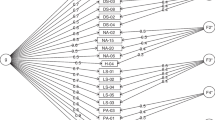Abstract
General happiness is philosophically construed as a sense of well-being which in turn has been defined either as a complete and lasting satisfaction with life-as-a-whole or as a preponderance of positive over negative feelings. A factor analysis of thirteen well-being scales shows that these two definitions coalesce into a single general well-being factor which is distinguishable only from an independent stress/worries factor. Further evidence shows that familiar scales of neuroticism, depression and trait anxiety measure the same well-being dimension if only in the negative half-range. So does a list of somatic complaints. Various two-factor models of well-being that treat positive and negative affect as independent processes, or that distinguish between affective and cognitive components, are challenged on the grounds that they depend on the properties of Bradburn's affect scales which are found to be highly dependent on methodological parameters. Attention is drawn here to the role of test method effects and curvilinearities as factors influencing inter-scale correlations and structural models. It is concluded that well-being is a robust, primary dimension of human experience and that happiness research is alive and well in psychology.
Similar content being viewed by others
Bibliography
Andrews, F. M. and A.McKennel: 1980, ‘Measures of self-reported well-being’, Social Indicators Research 8, pp. 257–298.
Andrews, F. and S. R.Withey: 1976, Social indicators of well-being (Plenum Press, New York).
Barrow, R.: 1980, Happiness, 2nd ed. (Martin Robertson, Oxford).
Bradburn, N. M.: 1969, The structure of psychological well-being (Aldine, Chicago).
Bradburn, N. M. and D.Caplovitz: 1965, Reports of happiness: A Pilot Study of Behavior Related to Mental Health (Aldine, Chicago).
Brenner, B.: 1975, ‘Quality of affect and self-evaluated happiness’, Social Indicators Research 2, pp. 315–331.
Brenner, B.: 1979, ‘Depressed affect as a cause of associated somatic problems’, Psychological Medicine 9, pp. 737–746.
Campbell, A., P. E.Converse and W. L.Rogers 1976, The Quality of American life (Russel Sage Foundation, New York).
Coan, R. W.: 1974, The Optical Personality (Columbia University Press, New York).
Costa, P. T. and R. R.McCrae: 1980, ‘Influence of extraversion and neuroticism on subjective wellbeing: happy and unhappy people’, Journal of Personality and Social Psychology 38, pp. 668–678.
Crowne, D. and D.Marlow: 1964, The Approval Motive (Wiley, New York).
Dupuy, H. J.: 1978, Self-representations of general psychological well-being of American adults (National Center for Health Statistics, Hyattsville, MD).
Eysenck, H. J. and S. B. G.Eysenck: 1964, Manual of the Eysenck Personality Inventory (University of London Press, London).
Fazio, A. F.: 1977, ‘A concurrent validational study of the NCHS general well-being schedule’, DHEW Publication No. (HRA) 78-1347 (National Center for Health Statistics, Hyattsville, MD).
Fordyce, M. W.: 1977, ‘Development of a program to increase personal happiness’, Journal of Counselling Psychology 24, pp. 511–521.
Gurin, G., J.Veroff and S.Feld: 1960, Americans View Their Mental Health (Basic Books, New York).
Kammann, R.: 1979, Sourcebook for Affectometer 1 (Why not? Press, Dunedin, New Zealand).
Kammann, R.: 1983, ‘Objective circumstances, life satisfactions and sense of well-being: consistencies across time and place’, New Zealand Journal of Psychology 12, pp. 14–22.
Kammann, R. and K.Campbell: 1983, Illusory correlation in popular beliefs about the causes of happiness', New Zealand Psychologist 11, pp. 52–63.
Kammann, R., D.Christie, R.Irwin and G.Dixon: 1979, ‘Properties of an inventory to measure happiness (and psychological health)’, New Zealand Psychologist 8, pp. 1–2.
Kammann, R. and R.Flett: 1983a, ‘Affectometer 2: a scale to measure current level of happiness’, Australian Journal of Psychology35, pp. 259–265.
Kammann, R. and R. Flett: 1983b, Sourcebook for measuring Well-Being with Affectometer 2 (Why not? Press Dunedin, New Zealand).
Krupinski, J. and A.Mackenzie: 1979, The Health and Social Survey of the North West Region of Melbourne (Special publication No. 17), (Institute of Mental Health Research and Postgraduate Training Health Commission of Victoria, Australia).
Lichter, S., K.Haye and R.Kammann: 1980 ‘Increasing happiness through cognitive retraining’, New Zealand Psychologist, 9, pp. 57–64.
Lorr, M. and T. M.Shea: 1979, ‘Are mood states bipolar?’, Journal of Personality Assessment 34, pp. 468–472.
Nunnally, J. C.: 1978, Psychometric Theory (2nd ed.) (McGraw-Hill, New York).
Russell, J. A.: 1979, ‘Affective space is bipolar’, Journal of Personality and Social Psychology 37, pp. 345–356.
Smith, T. W.: 1979, ‘Happiness: Time trends, seasonal variations, intersurvey diffences and other mysteries’, Social Psychology Quarter 42, pp. 18–30.
Tatarkiewicz, W.: 1976, Analysis of Happiness (Martinus Nijhoff, The Hague) (originally published 1962).
Vaillant, G. E.: 1979, ‘Natural history of male psychologic health: effects of mental health’, The New England Journal of Medicine 301, pp. 1249–1254.
Warr, P., J.Barter and G.Brownbridge: 1983, ‘On the independence of positive and negative affect’, Journal of Personality and Social Psychology 44, pp. 644–651.
Wessman, A. E. and D. F.Ricks: 1966, Mood and personality, (Holt, Rinehart and Winston, New York).
Author information
Authors and Affiliations
Rights and permissions
About this article
Cite this article
Kammann, R., Farry, M. & Herbison, P. The analysis and measurement of happiness as a sense of well-being. Soc Indic Res 15, 91–115 (1984). https://doi.org/10.1007/BF00426282
Received:
Issue Date:
DOI: https://doi.org/10.1007/BF00426282




